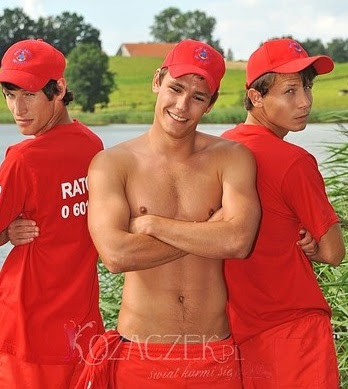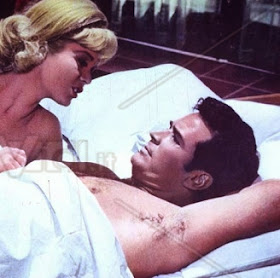The icon of the Polish comedy
Sexify, on Netflix, appears to show two women about to kiss, and a Google search of "Sexify" and "gay" reveals several articles about "The Best LGBTQ Series." So I'll take a look.
Scene 1: A naked woman slowly and luxuriously showering, while the camera closes in on her body parts...I think I'll fast forward past.
Scene 2: A party with a lot of boy-girl couples dancing. A hot guy tries to pick her up, but is rebuffed: "I don't dance...I don't drink...I have to go home to sleep. No, you can't come." She goes home, takes off her clothes, and straps herself into a weird mechanism while recording the time, date, humidity, and so on. I think I'll fast forward past this part, too.
Scene 3: At the University, the woman -- Natalie -- is in the bathroom, giving herself a pep talk, when a guy in a baseball cap comes in. She angrily tells him that if he wasn't an idiot, he would know that this is the ladies' room.
Scene 4: A giant lecture hall with only about 20 students, most from the party last night. This is their last semester, so the Dean has hired a superstar guest prof to guide them through their final projects. The winner will be submitted to a big, famous national ministerial competition.
Whoops, the superstar guest prof, is Baseball Cap Guy! Natalie is already on the wrong foot, but it gets worse: she makes a fool of herself by answering a rhetorical question, and when she introduces her project, "Optimizing Sleep," Baseball Cap Guy abruptly cuts her off. He moves on to the Snob Rafal (Kamil Wodka, top photo), who has invented a hair gel that changes color via Bluetooth.
Scene 5: Natalie accosts Baseball Cap after class to whine: "I'm top of my class! I'm super smart! My project got an A last semester! Why are you so stupid that you don't realize that?" He explains that sleep is not sexy: "Invent an app that your peers will get excited about, something that they actually need."
"But...but...this project means everything to me! Without it, I'm nothing!' Gee, girlfriend, get a life.
Scene 6: Natalie goes home and tears down her wallful of post-it notes and cries.
Cut to a dorm room, where Natalie's BFF Paulina gets a phone call, but her boyfriend notes that he has an erection, so she doesn't answer. They begin sex (no beefcake), but he doesn't perform adequately, and finishes too soon. Another phone call: from Natalie.
Scene 7: In a clothing store, Natalie is complaining to BFF Paulina about the fiasco of class yesterday. Then she gets angry at BFF Paulina for choosing clothing just to please her boyfriend. "You've never been in a relationship, so you don't get it."
Scene 8: A muscular middle aged man and woman having sex
(rear nudity as he mounts her from behind). Whoops, they're on a balcony that looks down on the living room. Her father can see her! "What the fuck! Why are you here?" she screams. Hunk rushes out.
Dad is upset because she hasn't been to class in six months, and is generally slacking off. She's a student? I thought she was Natalie's mother. So he's cutting her off: no money until she gets that diploma, and she's moving out of her 3.5 million apartment ($800,000) into a dorm room.
The Heiress (Monika) privileges her way into the dorm, past about 30 flirting guys, and looks in horror at her tiny, industrial, metal-shelved dorm room.
Scene 8: Natalie working at a computer store with a balding boss and quirky customers. She complains about the prof rejecting her project.
Meanwhile, BFF Paulina and her boyfriend, who is either Mariusz (Piotr Pacek) or Marek (Cezary Pazura), are on a bus en route to his father's birthday party, discussing Natalie's new project. Is everyone obsessed with Natalie? Something sexy -- public transport?
Scene 9: The Heiress is trying unsuccessfully to make her dorm room look less awful. She ventures out into the hallway and flirts with a hot guy. Moan, thump off camera.
Natalie hears them and angrily bursts into the room to yell at them to stop (
now we see A LOT of beefcake!). "Join or leave!" the Heiress yells. She leaves.
Scene 10: BFF Paulina and her Boyfriend are at his parents' house with a bunch of old people, singing a birthday song. It's Dad's birthday, but Boyfriend thinks that this would be a good time to propose! Way to put the girl on the spot, in front of all your relatives, a long bus ride from home! "Sure, ok," she says with a look of pure horror.
Later, she is lying alone in bed, checking to see how much the ring costs, when Boyfriend sneaks in! "But your parents will hear us!" Not to worry -- he's very bad at it, and finishes instantly. But he soiled her sheet!
Scene 11: The university. Heiress walks in late to a lady professor droning on about coding. She's not in the course roster, so the professor kicks her out; she immediately complains to the Dean about "harassment." Maybe she means sexual harassment?
Meanwhile, Natalie asks Rafal the Snob to join forces on an app. He thinks that she means dating, and eagerly agrees.
Scene 12: Outside of class, the Heiress is stalked by her ex-boyfriend, Konrad (Bartosz Gellner). To escape him, she hitches a ride with a passing motorcyclist.
Back in the dorm, she swipes through a tinder-like app and chooses the muscular, balding Artem, who happens to be delivering take-out orders to her building.
Sex with her on top, so we only get an obscured view of his chest. Meanwhile, Rafal the Snob gets ready for his "date" with Natalie. He borrows a cactus and a condom from his roommate Grzegorg, who is busily cooking drug-laced gummy worms.
Scene 13: Natalie is in her dorm room, annoyed over the Heiress's loud sex. But before she can rush over to stop it, Rafal the Snob arrives. She begins talking about her app idea, but he thinks she is talking about sex. Then he smooches her, and all hell breaks loose. "What are you doing! Get out!"
BFF Paulina bursts in just as he is leaving, accidentally hitting him with the door and knocking him out. He quickly awakens and leaves.
Scene 14: The Heiress is still having sex with the Delivery Guy, when Stalker Konrad knocks on the door! She hides Delivery Guy in the closet (
naked butt as he is pushed in) and tries to climb down from the balcony. The entire dorm sees her naked.
So do we --way too much of her. Scene 15: Natalie and BFF Paulina let the Heiress into their room. Lots of boob shots as she flounces around, discussing how much she likes sex. But BFF Paulina doesn't like it, because her Boyfriend is inept.. And Natalie has never done it.
Konrad leaves, so Delivery Guy comes to fetch the Heiress (chest and butt shots). And Natalie has an idea (finally!): an app about sex.
Beefcake: Lots, but it is usually during sex with naked ladies.
Sights: Few exteriors.
Heterosexism: As Madonna said, sex is not love, and love is not sex. There are romantic relationships and sexual relationships, and occasionally you get both with the same person.
Gay Characters: Just the Heiress's bi-accessible line, and the hint that Natalie is asexual. Research reveals that she will find True Love later. Also there are "some minor gay characters," including Natalie's boss at the computer store.
Will I Continue Watching: Natalie, BFF Paulina, and the Heiress work together to develop an app to help women achieve sexual satisfaction. Not really my cup of tea. However, there will probably be a lot of naked men, as the ladies conduct their research.
 Before the continuity is over (and Lord Worthnotting vanishes from the strip), the two have buddy-bonded so extensively that one could almost mistake them for the newlywed couple.
Before the continuity is over (and Lord Worthnotting vanishes from the strip), the two have buddy-bonded so extensively that one could almost mistake them for the newlywed couple.


















